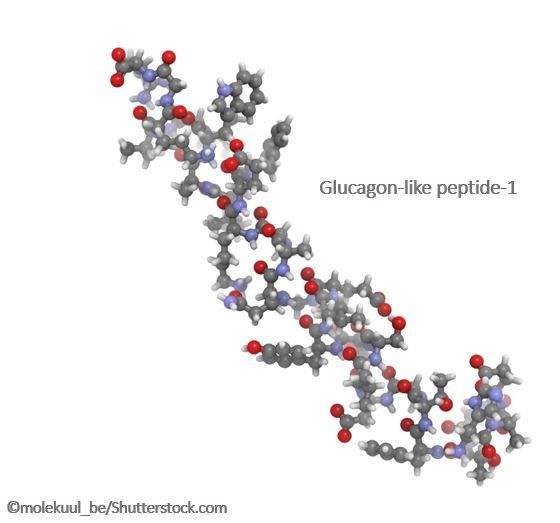Article
Semaglutide: More Weight Loss than Placebo, No Diabetes Required
Author(s):
In a new study, the GLP-1 receptor agonist semaglutide was associated with greater weight loss than placebo -- and liraglutide.

• Semaglutide significantly reduces weight in obese patients without type 2 diabetes when compared to liraglutide and placebo.
• Semaglutide is well tolerated with only minor GI effects at higher doses.
• Weight loss increased as dose of semaglutide increased.
Obesity is a common problem in, and contributor to the rise of, type-2 diabetes mellitus (T2DM). Glucagon-like peptide-1 (GLP-1) GLP-1, an incretin, is known to regulate insulin secretion and appetite. It has been observed through treatment of T2DM patients with GLP-1 receptor agonists like liraglutide and semaglutide, that significant weight loss accompanies treatment.
Prior research revealed that up to two-thirds of adults with T2DM taking semaglutide lost at least 10% of their body weight compared to only one-third of those taking liraglutide.
Patrick O’Neil, PhD, and colleagues from multiple international centers questioned whether or not semaglutide could increase weight loss in obese patients without T2DM. To answer this question the researchers designed a trial to compare the effect on weight loss of semaglutide to liraglutide and placebo in obese patients without T2DM, combined with diet and exercise counseling. They presented their findings in March at the ENDO 2018 annual meeting in Chicago.
The Study
The trial was a multinational, randomized, double blind, dose-ranging study looking at 957 patients with obesity (mean BMI, 39kg/m2) but not T2DM. Participants had a mean age of 47 years and the group was 35% male.
Subjects were randomized to receive once-daily injections of liraglutide, semaglutide, or placebo (matched for injection volume/dose escalation schedule). Semaglutide doses ranged from 0.05 mg to 0.4 mg while the liraglutide dose was 3 mg. All groups received counseling on diet and physical activity.
The Results• Average weight loss in 52 weeks was -2.3% (placebo) and -7.8% (liraglutide 3 mg), vs. -6.0% (0.05 mg; P=0.001 vs. placebo), -8.6% (0.1 mg), -11.6% (0.2 mg), -11.2% (0.3 mg) and -13.8% (0.4 mg; P<0.0001 vs placebo for 0.1-0.4 mg).
• On average, higher percentages of weight loss occurred in the experimental groups:
• Weight loss ≥5% occurred in an estimated 23% (placebo) and 66% (liraglutide 3 mg) vs on semaglutide at the following doses: 54% (0.05 mg), 67% (0.1 mg), 75% (0.2 mg), 81% (0.3 mg), and 83% (0.4 mg) of subjects (all P<.0001 vs. placebo).
• Weight loss ≥10% occurred in an estimated 10% (placebo) and 34% (liraglutide 3 mg) vs 19% (semaglutide 0.05 mg; P=not significant vs. PBO), 37% (0.1 mg), 56% (0.2 mg), 58% (0.3 mg), and 65% (0.4 mg) of subjects (P<.0001 vs placebo for 0.1 - 0.4 mg).
• No serious adverse events were recorded with the most common side effects being mild GI upset (a known class effect of GLP-1 receptor agonists).
Implications for Physicians
• At all dosing levels, semaglutide was associated with significantly greater weight loss when compared to placebo.
• Dr. O’Neil stated, “The highest-dose group had weight loss greater than what is typically seen with pharmaceutical plus lifestyle change treatment (13.8%).”
• Physicians with non-diabetic obese patients can consider using semaglutide along with education on diet and exercise as a part of a weight loss plan.
• For patients requiring greater weight loss, semaglutide dose may be increased to augment results while physicians should remain mindful of possible GI side effects at higher doses.
Abstract: O’Neil PM, Birkenfeld AL, McGowan B, et al. A randomized, phase II, placebo- and active-controlled, dose-ranging study of semaglutide for treatment of obesity in subjects without diabetes. Paper presented at: The Endocrine Society Annual Meeting; March 2018; Chicago, IL. Abstract OR12-5.




